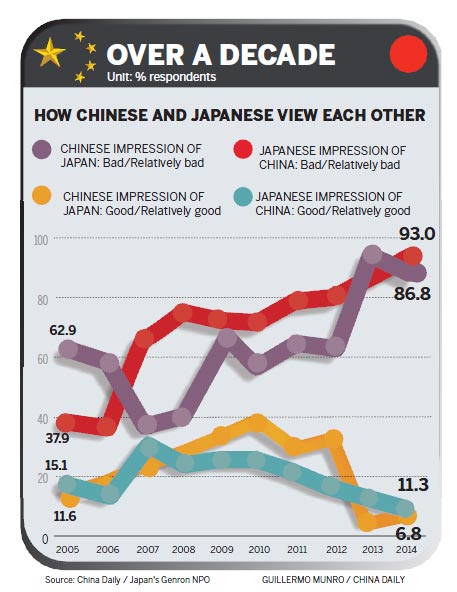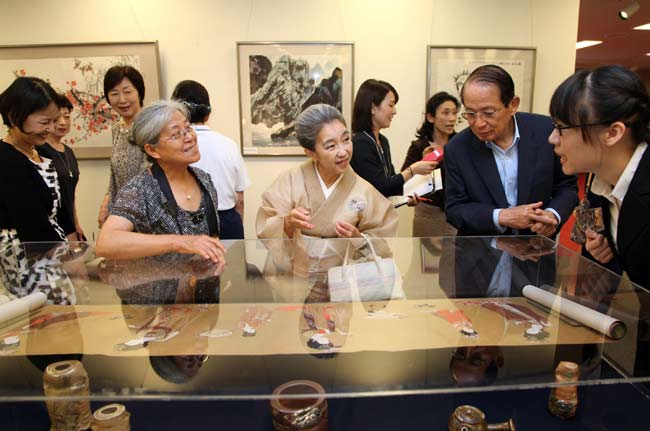Survey finds pessimism in ties with Japan
By Zhang Yunbi in Beijing and Cai Hong in Tokyo (China Daily) Updated: 2014-09-10 07:40Public opinion poll shows lessening effect of Diaoyu Islands dispute, but cloud remains, report Zhang Yunbi in Beijing and Cai Hong in Tokyo.
The impact of the Diaoyu Islands dispute on China-Japan ties is diminishing, but pessimism over future relations remains, the latest public opinion poll in both countries showed.
A majority of the public continued to see the significance of the relationship but "the proportion of such people is shrinking to a record low on both sides" - 65 percent of those polled in China and 70.6 percent in Japan.
The 10th Public Opinion on China-Japan Relations 2014 survey, co-sponsored by China Daily and the Japanese nonprofit think tank Genron NPO, was released in Tokyo on Tuesday.
The latest poll follows two years of global attention on security policies and territorial disputes between Asia's two largest economies, as well as Tokyo's official positions regarding its wartime atrocities.
The annual poll, conducted in July and August this year, gathers responses from a wide spectrum of society.
In China, the survey included 1,539 Chinese residents in the major cities of Beijing, Shanghai, Chengdu, Shenyang and Xi'an, 201 international relations scholars from around the country and 813 university students and faculty members at five top Beijing universities. In Japan, respondents included 1,000 members of the public and 628 intellectuals, mostly with experience of China.
Observers said the poll reflects that rational responses to differences are spreading, and that will create a more favorable climate for thawing ties.
The 10th Beijing-Tokyo Forum, co-hosted annually by China Daily and Genron NPO, will be held in late September in Tokyo.
Li Wei, director of the Institute of Japan Studies under the Chinese Academy of Social Sciences, said that the past decade covered by the survey and the forum has witnessed "a period of transition of the China-Japan relationship" as well as "a decade of drastically changing mindsets on both sides".
"We are going through a test from the transition of a time when a record number of issues broke out simultaneously and overlapped each other," Li said.
When asked about the largest stumbling block for the relationship, both the Chinese and Japanese public named the islands dispute as their top concern, yet the portion in both sides shrank this year - 64.8 and 58.6 percent, respectively, from 77.5 and 72.1 percent last year. Chinese respondents said "the lack of political mutual trust between the Chinese and Japanese governments", "the issue of Japan's outlook on its history and education" and "disputes over maritime resources" were also their major concerns.
Japan's image in the eyes of the Chinese public has "slightly improved" in the past year because the portion of Chinese people having a "bad" or "relatively bad" impression about Japan dropped by about 6 percentage points from the previous year to 86.8 percent of those polled.
But in Japan, the corresponding figure hit a record 93 percent this year.
Kevin Jiang, vice-general manager of market research consultancy Horizonkey Information and Data Co Ltd, said: "Compared with the large number of Japanese people who harbor ill-will toward China, Chinese people are relatively more rational."
- Govt encourages people to work 4.5 days a week
- Action to be taken as HIV cases among students rise
- Debate grows over reproductive rights
- Country's first bishop ordained in 3 years
- China builds Tibetan Buddhism academy in Chengdu
- Authorities require reporting of HIV infections at schools
- Typhoon Soudelor kills 14 in East China
- Police crack down on overseas gambling site
- Debate over death penalty for child traffickers goes on
- Beijing to tighten mail security for war anniversary









